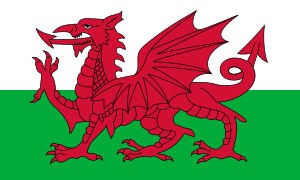1869 in Wales
| |||||
| Centuries: |
| ||||
|---|---|---|---|---|---|
| Decades: |
| ||||
| See also: |
| ||||
This article is about the particular significance of the year 1869 to Wales and its people.
Incumbents
Events
- January
- Henry Austin Bruce becomes MP for Renfrewshire.
- Timothy Richards Lewis goes to India to study cholera.
- 1 May — The Western Mail is published for the first time.[1]
- 19 May — Two days after John Young, the English manager of the Leeswood Green colliery, announces a pay cut, he is attacked by some of his workers.
- 2 June— Seven men are tried at Mold for attacking John Young. A riot breaks out as those convicted are being transported to the railway station; soldiers fire on the crowd, killing four people.[2]
- 10 June — Three people are killed in a train derailment at Maesycwmmer in Glamorgan.
- 1 September — The Dyserth branch line is opened for goods traffic.
- 30 October — The first edition of the Welsh-language periodical, Y Goleuad, is published.
- Anti-Irish riots at Pontlottyn in the Rhymney Valley result in one death.
- Landore steelworks at Swansea established by Carl Wilhelm Siemens.[3]
- John Hughes of Merthyr Tydfil buys land near the Sea of Azov, where he develops an ironworks and founds the city of Yuzovka (later Donetsk).
- Joseph Leycester Lyne (Father Ignatius of Jesus) acquires land at Capel-y-ffin and begins construction of an Anglican Benedictine community, Llanthony Abbey (Llanthony Tertia).
- Construction of the fort at St Catherine's Island, off Tenby.
- Prehistoric burial remains are discovered at Parc le Breos on the Gower Peninsula.
- John Owen of Tyn-llwyn is evicted from his farm for voting Tory.
Arts and literature
Awards
- The first official National Eisteddfod of Wales takes place at Holywell.
New books
- J. H. Clark — History of Monmouthshire
- John Hugh Evans — Pryddest Goffa i Thomas Aubrey
- Jane Hughes — Galargan am y diweddar Barch. Henry Rees, Liverpool
- David Watkin Jones (Dafydd Morgannwg) — Yr Ysgol Farddol
- Nathaniel Jones (Cynhafal) — Elias y Thesbiad
- John Petherick — Travels in Central Africa and Explorations of the Western Nile Tributaries
- William Rowlands — Llyfryddiaeth y Cymry (Bibliography of the Welsh) (posthumous; ed. Daniel Silvan Evans)
- Jane Williams (Ysgafell) — A History of Wales derived from Authentic Sources
- Robert Williams (Trebor Mai) — Y Geninen
Music
- Owen Jones — Hymnau Hen a Diweddar (collection of hymns)
Sport
- Football — Ruabon footballers set up a club at Plas Madoc.
- Mountaineering — Emmeline Lewis Lloyd attempts an ascent of the Matterhorn.
Births
- 11 January – Ralph Sweet-Escott, English born, Wales rugby international (died 1907)
- 9 April – John Hugh Edwards, politician (died 1945)
- 19 May – John Henry Williams, Welsh politician (died 1936)
- 20 May – Robert Griffith Berry, minister and writer (died 1945)
- 30 May – Thomas Rees, theologian (died 1926)
- 12 August – Fred Parfitt, Wales international rugby player (died 1953)
- 6 September – Walford Davies, composer (died 1944)
- 24 September – Maud Cunnington, archaeologist (died 1951)
- 29 October – Bill Morris, Wales international rugby player (died 1946)
- 9 November – Osbert Fynes-Clinton, dialectologist (died 1941)
- 12 November – Arthur Leonard Leach, geologist and archaeologist (died 1957)
- 15 November – Percy Bennett, Wales international rugby player (died 1936)
- 20 November – Herbert Tudor Buckland, architect working in Birmingham (died 1951)
- 26 November – Princess Maud of Wales, queen consort of Norway (died 1938)
Deaths
- 18 February – Henry Rees, Calvinistic Methodist minister, 71
- 23 March – William Williams (Caledfryn), poet, 68
- 31 March – David Rees (Y Cynhyrfwr), Nonconformist leader and author, 67
- 16 April – James Davies (Iago ap Dewi), poet, 68
- 12 May – Thomas Walter Price (Cuhelyn), journalist and poet, 39
- 1 July – David Jones, banker and politician, 58
- 14 July – Lloyd Kenyon, 3rd Baron Kenyon, 64
- October – John Jones (Talhaiarn), poet, 59
- 15 December – David Williams, politician, 70
- 17 December – Sarah Jacob, "the fasting girl", 12
References
- ↑ Wales Online, "First ever Western Mail edition: May 1, 1869". Accessed 12 December 2013
- ↑ "The Riot In Wales". The Times (26455). London. 1869-06-04. p. 12.
- ↑ The Welsh Academy Encyclopedia of Wales. Cardiff: University of Wales Press. 2008.
This article is issued from Wikipedia - version of the 10/19/2016. The text is available under the Creative Commons Attribution/Share Alike but additional terms may apply for the media files.
